How Many Backlinks Do I Need To Rank? + 9 BETTER Questions
Daniel Trick
Jan 30, 2025
12 min read
At fatjoe, we’ve been building links for over a decade, and the top question we always get asked is, “is Joe really fat?”.
The other question we always get is “How many backlinks do I need to rank?”
While we’d argue this isn’t the best question to ask, we know clients won’t stop asking it.
With that in mind, we’ve created the fatjoe Backlink Framework to give you the answer you need.
Don’t worry, though, SEO pros. We’ve also prepared 9 BETTER questions to ask that will lead you, or your clients, to better SEO outcomes.
Prefer the video version? We’ve got you covered.
The fatjoe Backlink Framework – How Many Links Do I Need To Rank?
The simple answer is “it depends”.
That’s an SEO classic, but it won’t clients from asking, so with that in mind we’ve created the fatjoe Backlink Framework.
Better than a standard link gap analysis, the Backlink Framework lets you know how many links you need to outrank direct competitors.
We’ve broken it down into manageable DR tiers so you can target your link building exactly where it matters to catch up with your competitors.
You can see more about how the Backlink Framework works in the video below, and you can grab your own copy here.
Okay, so you’ve got an answer for how many links you need to rank. Is that everything?
Not at all.
How many links do I need to rank is a basic question for rookie SEOs, but SEO pros know to ask these 9 questions instead.
1.) What Are My Link Building Objectives?
Instead of:
“How many backlinks do I need to rank?”
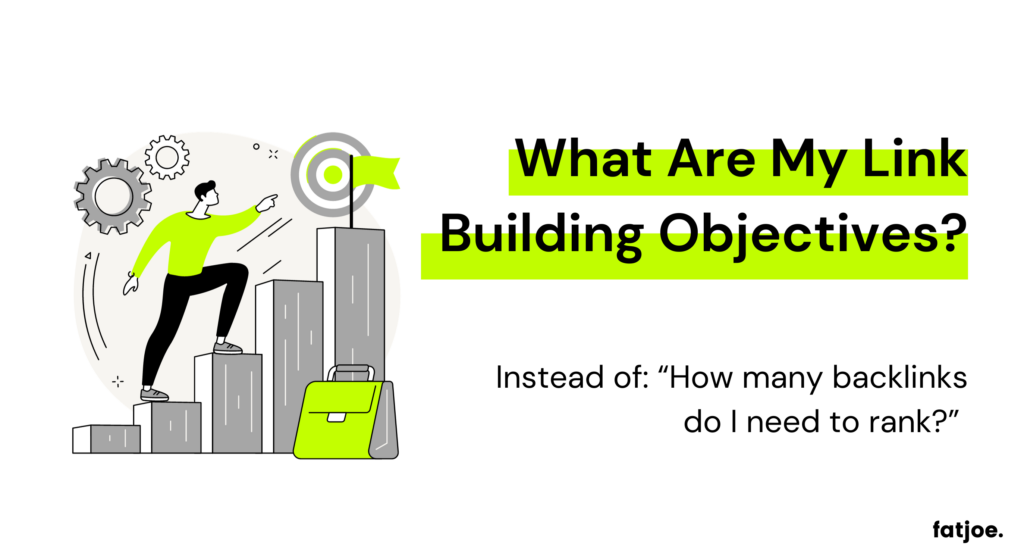
Link building should always be strategy-driven, and this includes determining what objectives you are hoping to achieve with your link building.
Focusing on acquiring a specific number of backlinks won’t work, as you cannot guarantee results from a set amount of links.
There are simply too many ranking factors in play beyond just links to be able to assign all of your SERP performance to backlinks alone.
A new website may only need a handful of high-quality backlinks to start ranking initially. If, however, it’s in a competitive niche, it could take many more links to start ranking at all for key terms.
It will always take more links (in conjunction with other optimization work) to rank well for competitive terms, or to reach position 1-3 for any important terms, whether they be easy or difficult.
Therefore, you can’t simply assign a set answer to “How many backlinks do I need to rank?”
A better use of your time is to determine your link building objectives and what action is required to achieve these goals.
Focus on specific goals for your pages and specific link opportunities, rather than a set number.
As with all things, quality wins out over quantity, and a targeted strategy pursuing specific relevant sites will pay off ahead of targeting a set number of links.
2.) How Important Are Backlinks?
Instead of:
“How many backlinks is good?”
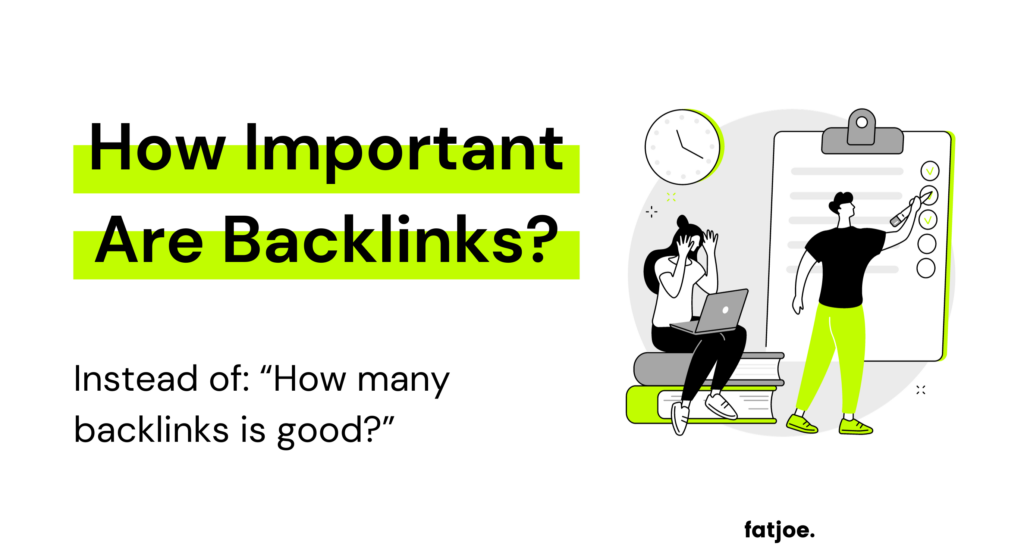
Link building and SEO go hand-in-hand, but it’s important to ask why this is and how important backlinks are overall.
The first point to address is how effective backlinks actually are.
Backlinks form the foundation of SEO, as they are one of the most significant indicators Google uses to determine the authority and credibility of a website. Google themselves have confirmed this.
In fact, when Google was first launched, most search engines were matching search terms solely to the frequency of their usage on a webpage, until Google created the PageRank algorithm.
This innovation determined a page’s importance using backlinks to analyze the relationship between websites – hence Google’s original name, “BackRub”.
Backlinks are not the only factor, however, and should be included as part of an all-encompassing SEO strategy.
You can build all the links you like, but if they’re pointing to a low-quality or under-optimized site, they won’t stand a chance of helping you rank consistently.
Instead, you need to partner link building with on-page optimization and traditional marketing efforts for optimal efficacy.
3.) How Do I Analyze My Competitors’ Backlinks?
Instead of:
“How to check how many backlinks a website has?”
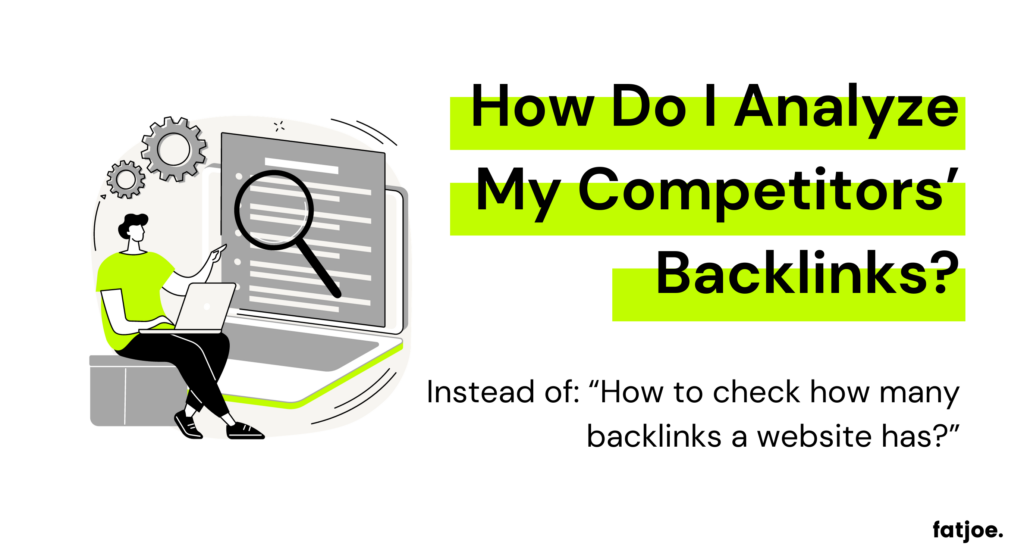
The number of backlinks a website needs can vary greatly depending on the competition within the industry niche.
It might be tempting to use the number of links your competitor has as a firm target for your own links. If they have 100, you need 200 – simple!
Sadly it doesn’t work like that. As we mentioned earlier, Google has so many different ranking factors that you can’t simply chalk a competitor’s success up to backlinks and outdo them by doubling their count.
Securing more links than your competitor is certainly helpful, but what you really need to know is how to analyze your competitor’s backlinks.
We’ve written a full breakdown of how to analyze your competitor’s backlinks, but the key takeaways are:
- Pay attention to the domains they get links from
- The pages they receive links to
- The content on your competitor’s pages

You should use this information to then inform your link-building strategy. You might need to work on your own content to be able to outperform theirs and attract more links.
If you’re building links to low-quality or spammy pages, you won’t be able to outrank your opposition, even if you’re doubling their link count. Quality matters.
Similarly, you should pay attention to where your competition is securing links from. If they’re securing links from high-quality sources which are niche relevant, you’ll need to match this to keep up – it can’t simply be solved by outdoing them with link volume.
4.) How Do I Monitor My Own Backlinks?
Instead of:
“How many backlinks does my website have?”

The reason this is a better question to ask is because it shifts the spotlight away from just the volume of backlinks you have, instead focusing on the quality of your site’s backlinks.
A single high-quality, relevant link from an authoritative site could do more for your rankings than a dozen unrelated or spammy links.

Monitoring your backlinks is a vital part of the SEO process which can give you the best understanding of where your link building is succeeding and really generating results for you.
While it’s still important to understand how many backlinks your site has, assessing the quality of the links you have will always be more important as this can inform your decision-making down the line.
Monitoring your backlinks can also let you track and recover impactful links that are lost, which may be missed if you simply track the sheer number of links you have.
5.) How Often Should I Build Backlinks?
Instead of:
“How many backlinks do I need per month?”
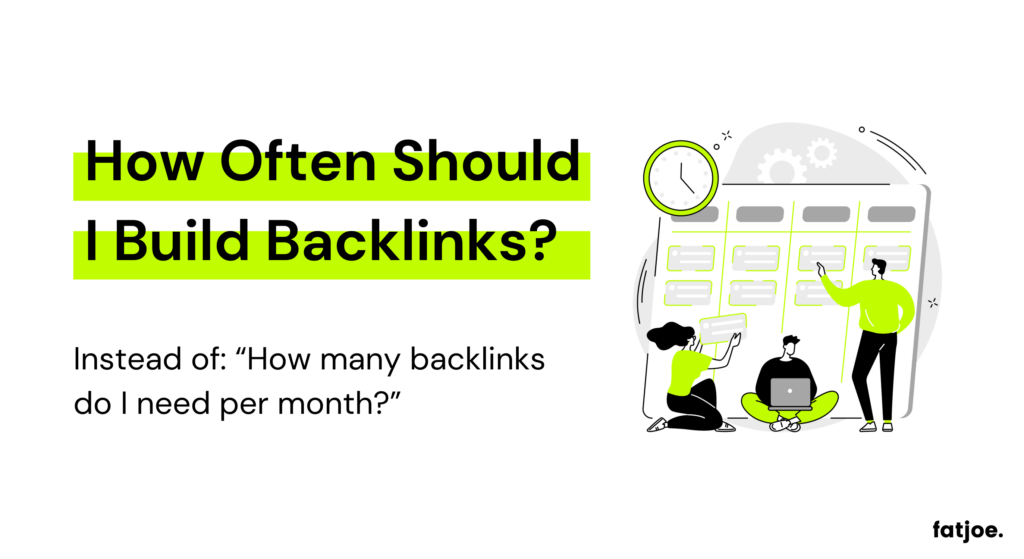
Focusing more holistically on when you should build links will allow you to develop a better strategy than simply setting a monthly quota for link acquisition.
First and foremost with all link building you should look to mimic natural link acquisition.
Acquiring the same number of links month in, month out, simply does not appear natural and could be a clear sign to Google and other search engines that your link profile is being manipulated.
If you instead think about how often and when you should build links you can tie them in with your overall SEO and marketing strategy.

If you have a new product launching that could be a great time to build new links, often specifically to that new product or related pages. Customers and media outlets would naturally be buzzing about this new development and so raking in new links at this time will be entirely natural-looking and will help complement your other marketing pushes.
As part of your SEO strategy, your links should also coincide with your content strategy. If you’re publishing high-quality content, you’ll likely receive backlinks naturally over time, so building links alongside your publishing schedule can work nicely.
With this approach, however, be mindful that links to new content should occur naturally.
Building 5 links to a new page on the same day as publishing will not appear natural, so just ensure there is a delay between the content you publish and the links you build to it.
6.) Should I Build More Links From The Same Website?
Instead of:
“How many backlinks can I get from one website?”

Building more links to your site from the same domain can actually be beneficial to your site, despite what you may have heard otherwise.
As long as the new links come from different pages and aren’t flagged as coming from link schemes or due to spammy tactics, they can provide additional value to your domain.
Don’t think of securing a link from a domain as being one-and-done for value. Instead, think of securing multiple links from the same domain as instead confirming to Google that the site really does trust and value your services/products/content.
The key thing is to focus on varying your links across different domains. Some specific domains will offer more relevant content opportunities to receive links from. They might have a review section that can fit a link to your product page, while their advice section instead fits a link out to one of your helpful articles.

Broaden your scope beyond just one backlink per domain.
Google will still value those additional links from the original domain as long as they are contextually relevant and not spammy.
“How many backlinks can I get from one website?” focuses too much on pushing the bounds of how many you can get. Instead, as ever, focus on acquiring quality link mentions with a natural cadence and velocity.
The vital point is to avoid generating an unnatural link footprint. In this instance it would only be unnatural if you forced an unreasonable number of links from the same domain, and failed to receive links from other domains.
7.) How Diverse Should My Backlinks Be?
Instead of:
“How many backlinks should I get?”

Once again, the problem with the first question is that it just focuses on the base number with no context.
Simply asking how many links you should get is a problem on two fronts.
Firstly, it assumes there is a set answer and there simply isn’t. You can use competitor analysis to get an idea of roughly how many you should be aiming for compared to strong competitors in your niche, but that isn’t a set value.
Secondly, it doesn’t consider the diversity of the links you are receiving. Even if you set a goal to acquire 20 links there is a world of difference between securing those links from genuine, trusted sources or getting them from PBNs.
A healthy website’s backlink profile should include links from a range of sources. This doesn’t just mean different blog sites but diversity in the overall category of links such as:
- Blog links
- News sites
- Online magazines
- Directories
- Forums
- Accreditations
- Review sites
- Social media
As we’ve covered before, there are a number of ways to get new backlinks with all sorts of creative strategies available to SEOs.
These varied tactics are important not only for freshening up your link pitching but also for diversifying the link sources you acquire. Not all of the tactics are viable for every link source, so mixing up the strategies you use will naturally vary the links you acquire.
Blog and magazine links are general purpose and can fit most businesses, whether they’re linking to products or posts/articles from the client site.
Directories are suitable for businesses, especially those with brick-and-mortar stores.
Accreditations are perfect for service or product-based businesses and also help reiterate the reputability of the client at the same time. For example, B-Corp accreditation can both snag you a link and display high standards to potential customers.
Review site links lend themselves to product or service-based clients; links to blog posts or articles wouldn’t make as much sense here.
Social media links can be leveraged by any client, but they can work especially well with links to helpful articles answering audience questions, or links to products from promotional pushes.
8.) Is The Quality Of My Backlinks More Important Than The Quantity?
Instead of:
“How many backlinks is too much?”
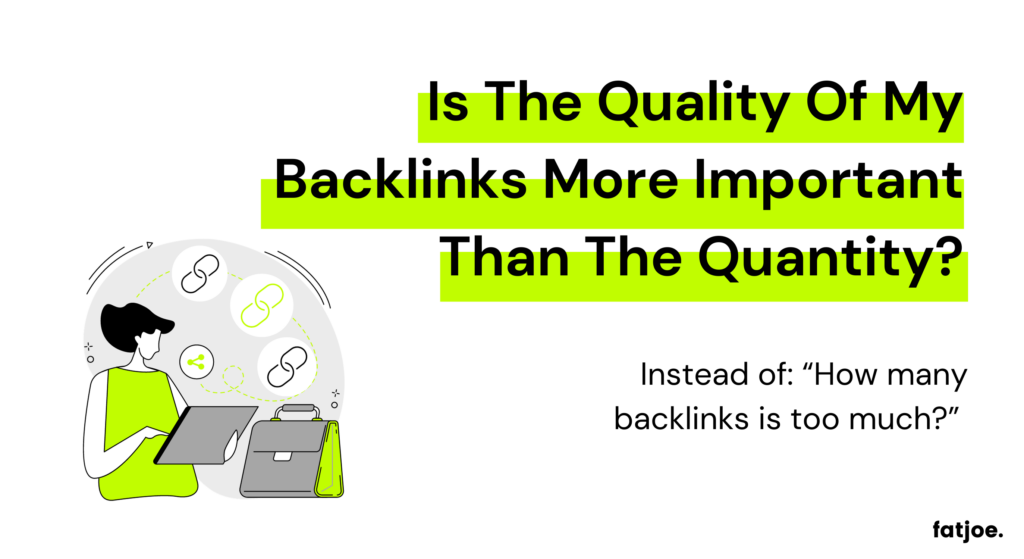
“How many backlinks is too much” is slightly more useful here, if only because it acknowledges there might be such a thing as getting too many links and it doesn’t suggest aiming for a specific number.
It’s still not, however, the correct question. A better initial question to ask is if the quality of backlinks is more important than the quantity.
The answer is yes. Absolutely yes. Entirely yes.
But, as ever in SEO… it also depends.

The reason for this infuriating take is that you do need some volume in order to be ‘spotted’. A single stray link, no matter how good, can easily be overlooked. There will always be a need for quantity to some degree, but it is not and should never be the driving factor.
Instead, you should look to build up a decent quantity of high-quality links as part of your curated link building efforts. When the links you are building are from quality sources and linking to quality pages, you can never have too much!
Whether you choose to handle link building yourself or instead look to outsource it, you should remember this will all be happening in tandem with your site’s natural, uncontrolled link pickup. Your focus should be on quality over quantity throughout all your SEO work.
9.) How Do I Know A Backlink Is Quality?
Instead of:
“How many high-quality backlinks do I need?”

Again the focus on a set number is the wrong mindset here.
It’s well known that high-quality backlinks from reputable websites can greatly improve a website’s rankings, just as low-quality links from spammy or irrelevant sites can harm them.
Assessing the quality of your inbound links is vital not only because of the good they can do but also due to the harm they can otherwise potentially cause if you leave them alone.
It’s perfectly natural for sites to pick up occasional spammy links – you can’t stop others linking to you no matter how much you might wish otherwise. You can, however, then take proactive steps to distance yourself from the links and even to disavow them if needed.
In the case of spammy links the harm they can cause far outweighs any potential benefit afforded to your site and your SERP positioning simply due to the fact you have more links.
There are a plethora of SEO metrics out there that can help you ascertain the relative quality of an inbound link or the linking domain to help you assess the value of that link.
The sheer number of backlinks is not the only metric to consider when evaluating the quality of backlinks, other metrics such as Domain Authority (DA), Page Authority (PA), and Trust flow (TF) can also be used to evaluate the quality of backlinks.
Taking a moment to consider the potential value of inbound links will force you to develop a more comprehensive SEO strategy, even if it’s only by naturally slowing you down as you take the time to consider each link.
So, What’s The Answer?
More than anything else, the answer to all of the questions in this article is to prioritize quality over quantity with your link building.
Use link building as a targeted means of acquiring new valuable links and shift yourself away from a numbers-first approach.
Whether you’re looking at your own site or a competitor’s, the number of backlinks a site has can be a helpful metric but only when it is taken in consideration alongside a number of other factors.
Your link building, whether in-house or outsourced, should always focus on quality first and quantity second.
Become a Pro at SEO
Join 65,000 others and learn the secrets to SEO success with our weekly blog posts.
